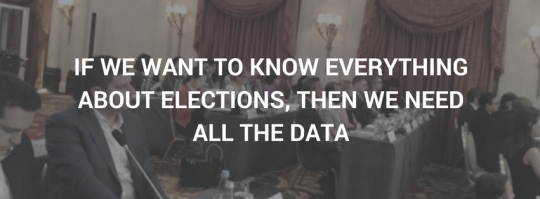Open data is both a preventive instrument against manipulations and a sign of cultural communication between those who owns the data and those who has a need and the right to access these data. Publication of open election data prevents conflicts, which often occur during elections. Candidates, parties, observers, journalists, and citizens, who have timely, complete and unimpeded access to the election data, don't have any grounds to mistrust the election commissions and question the election results. We need complete data, if we want to know everything about the election. If want to influence the process by our knowledge and assessment, we need the data when it's still topical and resonant for the society.
It's important to find a comprehensive solution for this issue. Unfortunately, some candidates and political technologists strive to find gaps in the legislation or manipulate the information, which is available only for the certain individuals or stakeholders. The more data we have to analyze the situation, the less chances is left for propaganda, misinformation, and formation of the parallel reality. The faster we access information through the open data, the stronger the influence of analytics, investigations or assessments on the ongoing election.
In 2015, OPORA monitored local elections held under a new electoral system. We organized long-term and short-term observation, high-quality nationwide statistically based observation of adherence to the electoral procedures, and parallel vote tabulation in big communities. Everything as usual, except for a newly-introduced electoral system, which needed evaluation after the election process. It was a proportional electoral system, which includes a party list voting in multi-mandate electoral district, whose rating in the party is determined when the election outcomes in a territorial election district are established. In fact, it's a modification of the St. Petersburg voting system. The data on election outcomes in territorial election commissions were neither collected nor systematized, and the commissions don't even have their own websites. Thus, an important stage of elections has remained unconsidered, because the citizens received final information on election outcomes and distribution of mandates, but didn’t receive the information about the voting in territorial districts. OPORA's observers and activists were so naive that decided to gather paper protocols, digitalize them and publish in open data format. Besides that, we planned to assess the system and activities of election commissions. What do you think we have achieved? All the protocols are archived in paper format, and availability of the access varies from region to region. In some regions, for example, they can send you scanned copies at e-mail. In other regions, they suggest you to come and make copies yourself; and in one third of regions, the access to paper documents will officially cost you a significant amount. After two years of efforts, we have managed to digitalize around 40% of protocols. Official correspondence is still ongoing with the certain territorial commissions and archives, urging us to use court mechanisms for protection of our citizen rights. Quite an interesting lesson isn't it. Especially for the country, which supports the OGP, open parliament and has been improving in publication of open data on the national and local levels. So why do we stay in XX century when it comes to the election data, then?
One may make groundless statements claiming that the elections were the fairest and the most democratic for the whole Ukrainian history or, on the contrary, that the level of manipulations was unbelievably high. Unfortunately, the historical or institutional memory for such groundless affirmations is extremely short, but it wouldn't be groundless to state that such categorical praise or critics, not supported by the facts or calculations, is purposefully misleading, manipulative or comes from the speakers of political groups. Open election data can stop politically biased statements and render fake observation ineffective.
It's possible to organize the PVT (parallel vote tabulation) in large countries with ten thousands of polling stations and tens millions of voters, but this instrument allows to assess only the voting day and tabulation process. OPORA has been organizing PVTs in Ukraine since 2010, with 6 national campaigns covered by 18000 non-partisan observers. They all were professionally gathering the data at polling stations to publish PVT results on Monday morning, the next day after election. This instrument worked quite well these years, but there is still no answer to the question what happens in a multimillion country before and after the election. Even if you deploy hundreds of long-term observers, you will not get the answer, because their information about violations will be isolated. The comprehensive open election data should include information about candidates, commissions, election precincts, districts, election campaign, campaign financing, voter register, campaigning, violations, activities of law-enforcement bodies and courts etc.
OPORA launched its Map of Violations yet in 2012, containing all the information about violations, including geolocation, description of incidents, boundaries of districts and polling stations, and contacts of election commissions. We did it then to promote the transparency and access to public information. Later we added the voting results and election outcomes, as well as interpretations of financial reports on expenditures from electoral funds during national election campaigns. We published the digital data only from the certain regions, but in open data format. In 2015 and 2016, OPORA analyzed the efficiency of law enforcement bodies in criminal proceedings against electoral violations. As a result of our systematical analysis and monitoring, the number of court sentences under a serious category of violations has increased in 500%. Today we have a very ambitious goal: to facilitate the openness of all the data, related to the electoral process, or have an impact on it or its stakeholders. It's not a story about technophilia. We honestly believe that open election data will increase the trust between the society, electoral administrations and political players. We hope that 2019th in Ukraine will be dedicated to vital presidential and parliamentary elections. At the same time, the level of tension, conflicts or provocations can be significantly decreased through the transparency of the process.
